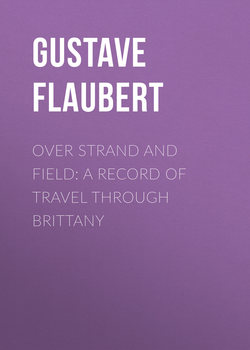Over Strand and Field: A Record of Travel through Brittany

Реклама. ООО «ЛитРес», ИНН: 7719571260.
Оглавление
Gustave Flaubert. Over Strand and Field: A Record of Travel through Brittany
OVER STRAND AND FIELD1
CHAPTER I. CHÂTEAU DE CHAMBORD
CHAPTER II. CHÂTEAU DE CLISSON
CHAPTER III. CARNAC
CHAPTER IV. QUIBERON
CHAPTER V. RETURN
CHAPTER VI. QUIMPER
CHAPTER VII. PONT-L'ABBÉ
CHAPTER VIII. ROAMING
CHAPTER IX. BREST
CHAPTER X. SAINT-MALO
CHAPTER XI. MONT SAINT-MICHEL
CHAPTER XII. COMBOURG
Отрывок из книги
We walked through the empty galleries and deserted rooms where spiders spin their cobwebs over the salamanders of Francis the First. One is overcome by a feeling of distress at the sight of this poverty which has no grandeur. It is not absolute ruin, with the luxury of blackened and mouldy débris, the delicate embroidery of flowers, and the drapery of waving vines undulating in the breeze, like pieces of damask. It is a conscious poverty, for it brushes its threadbare coat and endeavours to appear respectable. The floor has been repaired in one room, while in the next it has been allowed to rot. It shows the futile effort to preserve that which is dying and to bring back that which has fled. Strange to say, it is all very melancholy, but not at all imposing.
And then it seems as if everything had contributed to injure poor Chambord, designed by Le Primatice and chiselled and sculptured by Germain Pilon and Jean Cousin. Upreared by Francis the First, on his return from Spain, after the humiliating treaty of Madrid (1526), it is the monument of a pride that sought to dazzle itself in order to forget defeat. It first harbours Gaston d'Orléans, a crushed pretender, who is exiled within its walls; then it is Louis XIV, who, out of one floor, builds three, thus ruining the beautiful double staircase which extended without interruption from the top to the bottom. Then one day, on the second floor, facing the front, under the magnificent ceiling covered with salamanders and painted ornaments which are now crumbling away, Molière produced for the first time Le Bourgeois gentilhomme. Then it was given to the Maréchal de Saxe; then to the Polignacs, and finally to a plain soldier, Berthier. It was afterwards bought back by subscription and presented to the Duc de Bordeaux. It has been given to everybody, as if nobody cared to have it or desired to keep it. It looks as if it had hardly ever been used, and as if it had always been too spacious. It is like a deserted hostelry where transient guests have not left even their names on the walls.
.....
In the kitchen, situated in a wing of the castle, which we visited later, a maid was peeling vegetables and a scullion was washing dishes, while the cook was standing in front of the stove, superintending a reasonable number of shining saucepans. It was all very delightful, and bespoke the idle and intelligent home life of a gentleman. I like the owners of Chenonceaux.
In fact, have you not often seen charming old paintings that make you gaze at them indefinitely, because they portray the period in which their owners lived, the ballets in which the farthingales of all those beautiful pink ladies whirled around, and the sword-thrusts which those noblemen gave each other with their rapiers? Here are some temptations of history. One would like to know whether those people loved as we do, and what difference existed between their passions and our own. One would like them to open their lips and tell their history, tell us everything they used to do, no matter how futile, and what their cares and pleasures used to be. It is an irritating and seductive curiosity, a dreamy desire for knowledge, such as one feels regarding the past life of a mistress… But they are deaf to the questions our eyes put to them, they remain dumb and motionless in their wooden frames, and we pass on. The moths attack their canvases, but the latter are revarnished; and the pictures will smile on when we are buried and forgotten. And others will come and gaze upon them, till the day they crumble to dust; then people will dream in the same old way before our own likenesses, and ask themselves what used to happen in our day, and whether life was not more alluring then.
.....